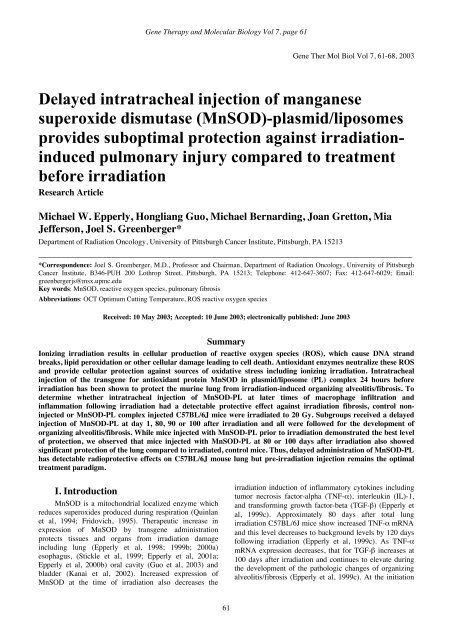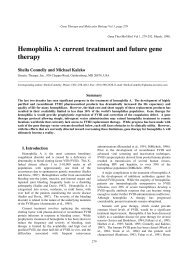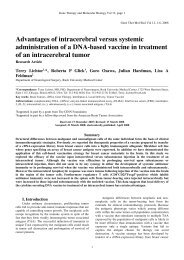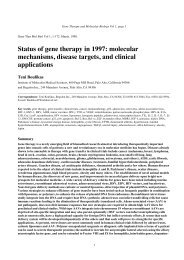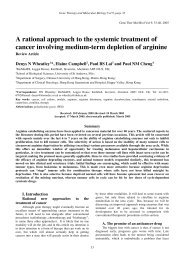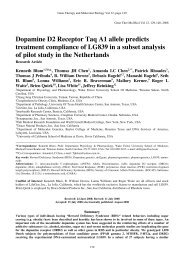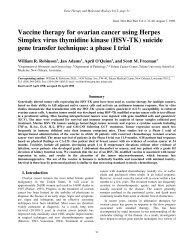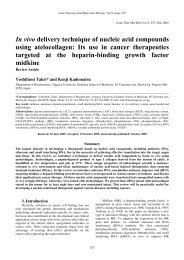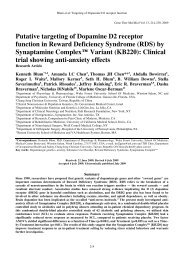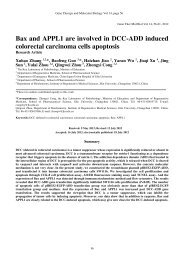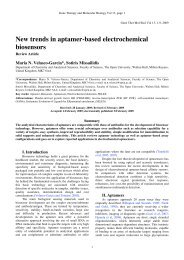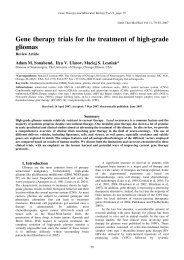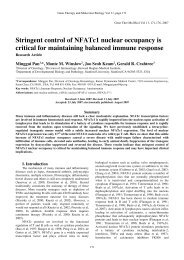GTMB 7 - Gene Therapy & Molecular Biology
GTMB 7 - Gene Therapy & Molecular Biology
GTMB 7 - Gene Therapy & Molecular Biology
You also want an ePaper? Increase the reach of your titles
YUMPU automatically turns print PDFs into web optimized ePapers that Google loves.
<strong>Gene</strong> <strong>Therapy</strong> and <strong>Molecular</strong> <strong>Biology</strong> Vol 7, page 61<strong>Gene</strong> Ther Mol Biol Vol 7, 61-68, 2003Delayed intratracheal injection of manganesesuperoxide dismutase (MnSOD)-plasmid/liposomesprovides suboptimal protection against irradiationinducedpulmonary injury compared to treatmentbefore irradiationResearch ArticleMichael W. Epperly, Hongliang Guo, Michael Bernarding, Joan Gretton, MiaJefferson, Joel S. Greenberger*Department of Radiation Oncology, University of Pittsburgh Cancer Institute, Pittsburgh, PA 15213__________________________________________________________________________________*Correspondence: Joel S. Greenberger, M.D., Professor and Chairman, Department of Radiation Oncology, University of PittsburghCancer Institute, B346-PUH 200 Lothrop Street, Pittsburgh, PA 15213; Telephone: 412-647-3607; Fax: 412-647-6029; Email:greenbergerjs@msx.upmc.eduKey words: MnSOD, reactive oxygen species, pulmonary fibrosisAbbreviations: OCT Optimum Cutting Temperature, ROS reactive oxygen speciesReceived: 10 May 2003; Accepted: 10 June 2003; electronically published: June 2003SummaryIonizing irradiation results in cellular production of reactive oxygen species (ROS), which cause DNA strandbreaks, lipid peroxidation or other cellular damage leading to cell death. Antioxidant enzymes neutralize these ROSand provide cellular protection against sources of oxidative stress including ionizing irradiation. Intratrachealinjection of the transgene for antioxidant protein MnSOD in plasmid/liposome (PL) complex 24 hours beforeirradiation has been shown to protect the murine lung from irradiation-induced organizing alveolitis/fibrosis. Todetermine whether intratracheal injection of MnSOD-PL at later times of macrophage infiltration andinflammation following irradiation had a detectable protective effect against irradiation fibrosis, control noninjectedor MnSOD-PL complex injected C57BL/6J mice were irradiated to 20 Gy. Subgroups received a delayedinjection of MnSOD-PL at day 1, 80, 90 or 100 after irradiation and all were followed for the development oforganizing alveolitis/fibrosis. While mice injected with MnSOD-PL prior to irradiation demonstrated the best levelof protection, we observed that mice injected with MnSOD-PL at 80 or 100 days after irradiation also showedsignificant protection of the lung compared to irradiated, control mice. Thus, delayed administration of MnSOD-PLhas detectable radioprotective effects on C57BL/6J mouse lung but pre-irradiation injection remains the optimaltreatment paradigm.I. IntroductionMnSOD is a mitochondrial localized enzyme whichreduces superoxides produced during respiration (Quinlanet al, 1994; Fridovich, 1995). Therapeutic increase inexpression of MnSOD by transgene administrationprotects tissues and organs from irradiation damageincluding lung (Epperly et al, 1998; 1999b; 2000a)esophagus, (Stickle et al, 1999; Epperly et al, 2001a;Epperly et al, 2000b) oral cavity (Guo et al, 2003) andbladder (Kanai et al, 2002). Increased expression ofMnSOD at the time of irradiation also decreases theirradiation induction of inflammatory cytokines includingtumor necrosis factor-alpha (TNF-α), interleukin (IL)-1,and transforming growth factor-beta (TGF-β) (Epperly etal, 1999c). Approximately 80 days after total lungirradiation C57BL/6J mice show increased TNF-α mRNAand this level decreases to background levels by 120 daysfollowing irradiation (Epperly et al, 1999c). As TNF-αmRNA expression decreases, that for TGF-β increases at100 days after irradiation and continues to elevate duringthe development of the pathologic changes of organizingalveolitis/fibrosis (Epperly et al, 1999c). At the initiation61


